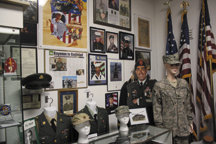As many as 1,000 students have passed through the doors to the veterans’ museum at the Joyce-Herbert Veterans of Foreign Wars Post 226 on West Ninth Street over the last year, and for Commander Glen J. Flora, it is not nearly enough.
He says kids don’t know enough about the sacrifices American veterans have made.
Each Tuesday, the veterans’ post throws open its doors for visitors to come see the collection of military items donated to the museum by Bayonne veterans.
Even with people crowding the other rooms, this space seems sacred, walls decorated with photos of local heroes dating back to World War I and mannequins wearing the actual uniforms worn by soldiers, sailors, marines and others who served their country.
“This place is like a chapel. Some veterans just come here and sit. Some even cry.” – Glen J. Flora
________
“We try to have guest speakers,” Flora says.
On Tuesday, May 11, students from Philip Vroom School came to hear former Mayor Richard Rutkowski, Frank Perrucci, Joseph Kennedy and Chuck Gallagher talk about their experiences in the military and then tour the museum where the post – thanks in large part to Kennedy – has gathered a very impressive collection of Bayonne military history, dating back beyond the American Civil War.
“We’ve added a number of new things,” Flora says, weaving through the display cases of the already well-stocked museum.
Local museum
He pointed to a picture of a dog tag of Henry Rhodes, a Bayonne soldier who had fought hand to hand on one of the Solomon Islands during World War II but had lost his dog tags there. A local resident went to a museum there, where the dog tags were on display. While the resident couldn’t bring back the tags, he snapped a picture of the tags that had the Bayonne address.
“The family still lived [here],” Flora said. “Henry died of natural causes in 1970.”
Another recent addition is a display to the memory of George Szewda, who spent time in a Nazi prisoner of war camp.
Flora points to yet another display dedicated to Angelo Squiteri, who received the distinguished service cross, the highest award a veteran can get short of the Congressional Medal of Honor.
‘Some even cry’
Flora treats this place like a church, moving from display to display as if through the Way of the Cross, each face from the past showing the remarkable sacrifices local residents made before they went on with more ordinary lives.
“This place is like a chapel,” he said. “Some veterans just come here and sit. Some even cry.”
Flora points to pictures in one exhibit of pilots once listed as missing in action, noting that one is still unaccounted for, while the other man’s remains were recently found.
Students come in and stare at the faces of men and women who were not much older than they are now, and yet they risked their lives for something larger and more important than merely work or school.
Each item, whether a hat or badge, canteen or medal, signifies an important moment not only in world history, but in the history of the people from Bayonne who went to war – some of whom never came back.
Covers every war
Thanks to gifts from veterans, local and far away, as well as family members of veterans, Bayonne has a very comprehensive museum of military artifacts covering every war from the American Civil War to the two contemporary wars in Iraq and Afghanistan.
Open for about three years, the museum has been called Bayonne’s best kept secret. While this is a compliment to how much is here, it is also a concern since this place contains the history of sacrifice Flora believes every child should know.
The Veterans’ Museum is located at the Joyce-Herbert VFW Post 226 16 W. 19th Street. For more information about hours or to schedule a visit, call (201) 858-1416.
